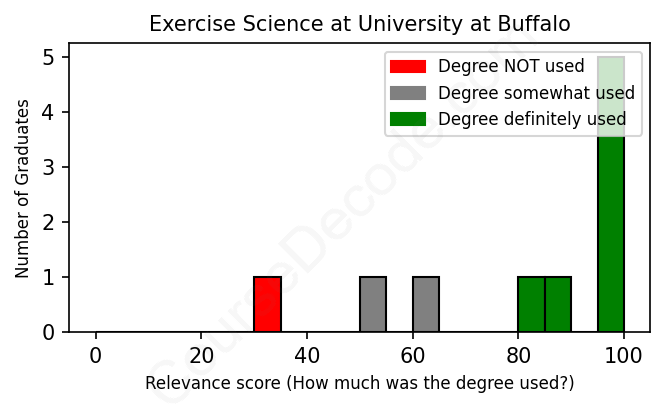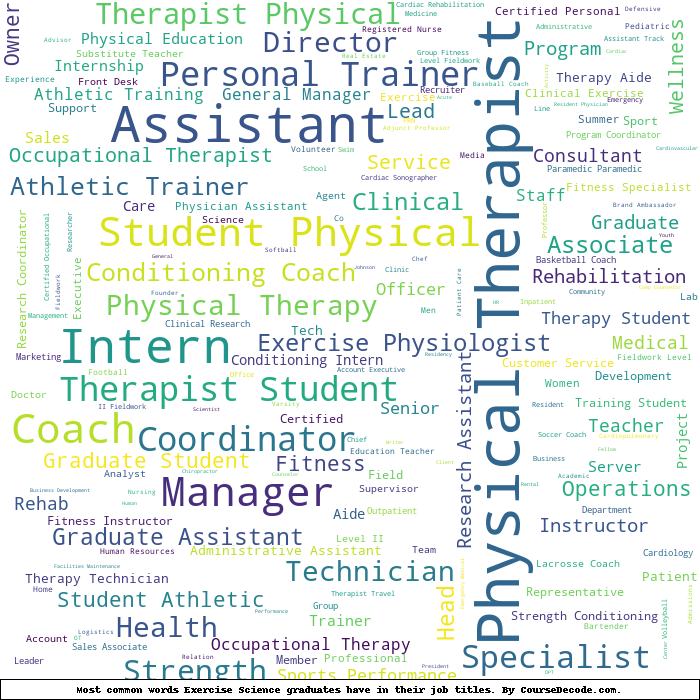
First, some facts. Of the Exercise Science graduates from University at Buffalo we've analyzed , here's how many have used (or NOT used) their degree in their career:

These are estimates based on AI analysis of 10 LinkedIn profiles (see below).
The verdict? Significantly above average. Overall, with an average relevance score of 81%, Exercise Science graduates from University at Buffalo have a much higher likelihood (+14%) of finding work in this field compared to the average graduate across all fields:
And for comparison, here's the chart for all profiles we've looked at across all degrees.
Also, after graduating, 80% of these graduates have pursued further education other than another Bachelor's degree (such as a Masters degree or other), compared to the average across all profiles of 35%. This suggests you may need more than just a Bachelors degree to be competitive as a Exercise Science graduate.
See the details:
|
Relevance score: 100% We think this person has gone into a career highly relevant to their degree. We think this person has gone into a career highly relevant to their degree.
DEGREE INFOGraduated in 2022 from University at Buffalo with a Bachelor's degree in Exercise Science. No other secondary education since. JOB HISTORY SINCE GRADUATIONIntern Strength Coach Impact Sports Performance Jan 2022 - Present Strength And Conditioning Coach  D1 TRAINING Jul 2023 - Present ABOUTRecently, I graduated from the University at Buffalo as an exercise science major. Also, I minor in nutrition and public health. As a career path, I want to pursue in strength and conditioning. I was once a former student athlete (played in football and baseball) and gained knowledge from my exercise science program that would allow me to assist athletes to reach their needs for the sport so that it can translate to success on the field. I have taken courses that have really helped me out such as biomechanics, strength and conditioning, exercise physiology and exercise nutrition. I enjoy working with people to help them reach their goals and that's why I am dedicated to be a strength and conditioning coach in the future. My overall mission is to gain as much experience possible and enjoy coming into work every day. I am passionate about exercise, health and sports and am willing to give full effort. |
The top 10 most common jobs done by the graduates we've analyzed (ranked most common to least) are:
When looking at jobs held by graduates from the University at Buffalo who studied Exercise Science, the most common types of roles tend to be centered around physical therapy and personal training. Many of the individuals have secured positions as Physical Therapists, which is a clear and direct application of the knowledge and skills they gained through their degree. Other notable positions include personal trainers and roles related to strength and conditioning coaching, which also clearly align with Exercise Science principles, focusing on physical rehabilitation, training, and fitness.
However, it’s important to point out that not every job listed is closely related to the field. Some positions, like internships in communications or roles in public health that don’t require specialized Exercise Science knowledge, only partially apply what they learned. So, while a significant number of alumni are landing jobs that directly relate to their degree, others seem to be in roles that might not fully utilize their expertise in Exercise Science. Overall, there’s a solid number of relevant job positions, but there are definitely cases of graduates veering off into roles that don’t tap into their exercise science training as much as one might hope.
Here is a visual representation of the most common words in job titles for Exercise Science graduates (this is across all Exercise Science graduates we've analyzed, not just those who went to University at Buffalo):

It looks like graduates from the University at Buffalo with a degree in Exercise Science generally find their footing pretty well in careers relevant to their field. Right out of school, many of them tend to snag positions like personal trainers, physical therapy aides, or health educators, which makes perfect sense given their training and interests. For instance, some graduates took on internships that set the stage for higher-level positions in physical therapy or health education. So, when they first dip their toes into the job market, they’re often joining roles that directly connect to exercise science and wellness from not just a physical standpoint but also a community health perspective.
Fast forward five to ten years, and it’s clear that a lot of these folks are moving up the ladder in impactful healthcare roles. Many have transitioned into physical therapists, exercise physiologists, and health program directors, often landing permanent positions that leverage their expertise. While a few have branched out into public health and wellness-related fields, most seem to remain connected to exercise science in some capacity. Overall, the trajectory from graduation to later career stages paints a pretty positive picture—most graduates are not just getting any job but are doing substantial, relevant work that aligns nicely with their degree.
Getting a Bachelor’s degree in Exercise Science at the University at Buffalo, or really anywhere, tends to be a pretty solid mix of challenging and manageable, depending on how much you’re into the subject. You’ll dive into some cool topics like anatomy, physiology, and biomechanics, which can get pretty intense, especially if you’re not super into science. There’s also hands-on coursework and labs that can be demanding, but if you enjoy staying active and learning about fitness, it can be really rewarding. Overall, it’s not as breezy as some degrees, but if you’re passionate about exercise and willing to put in the effort, you’ll likely find it to be a fulfilling experience rather than a total grind.
Most commonly, in the LinkedIn profiles we've looked at, it takes people 4 years to finish a Bachelor degree in Exercise Science.
Looking at the career paths of graduates from the University at Buffalo, it seems like most of them have been able to find jobs in the Exercise Science field that can lead to decent pay, especially those who became physical therapists. Physical therapists generally earn good salaries, and a lot of the grads who went that route have secured stable positions. Some have even climbed the career ladder in public health and wellness education roles, which can also be rewarding in terms of salary and job satisfaction. However, there are a few that started with internships or lower-paying roles which may have impacted their earnings in the early stages of their careers. Overall, it looks like if they’re sticking with their professions and gaining experience, they should be able to make a decent living!
Here is a visual representation of the most common words seen in the "about" section of LinkedIn profiles who have a Bachelor degree in Exercise Science (this is across all Exercise Science graduates we've analyzed, not just those who went to University at Buffalo). This may or may not be useful:

Here are all colleges offering a Bachelor degree in Exercise Science (ordered by the average relevance score of their Exercise Science graduates, best to worst) where we have analyzed at least 10 of their graduates:
| College | Score | Count |
|---|---|---|
 University at Buffalo University at Buffalo
|
81 | 10 |
 Grand Valley State University Grand Valley State University
|
68 | 10 |
 Appalachian State University Appalachian State University
|
68 | 14 |
 Slippery Rock University of Pennsylvania Slippery Rock University of Pennsylvania
|
68 | 11 |
 Kennesaw State University Kennesaw State University
|
56 | 10 |
 Brigham Young University Brigham Young University
|
51 | 26 |
 The University of Tennessee at Chattanooga The University of Tennessee at Chattanooga
|
44 | 10 |